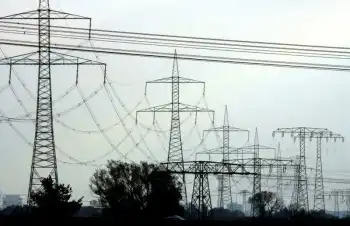Drastic changes needed to meet emission targets
By Canada.com
High Voltage Maintenance Training Online
Our customized live online or in‑person group training can be delivered to your staff at your location.

- Live Online
- 12 hours Instructor-led
- Group Training Available
Gord Miller said the province was at a "critical point" for changes to be done to transportation, energy and building sectors.
"All the weight has been put on electricity. There is huge opportunity in transportation reductions, huge industry reductions, huge opportunity in buildings for reductions but we don't have any of those tools itemized," he said at a Queen's Park news conference.
"The plan just forecasts failure going forward and that is just unacceptable."
In 2007, Ontario pledged to reduce green house gas emission targets by six per cent below 1990 levels by 2014. By 2020, the province's targets are supposed to be 15 per cent lower.
Miller said Ontario pledged to reduce emissions by 60 mega tonnes, yet currently, the projections say the province will only be able to reduce emissions to 34 mega tonnes by this time.
"We haven't figured out how to change, how to do business differently, live our lives differently, make our economy function differently such that our greenhouse gas emissions are lower," said Miller.
He suggested putting more effort towards reducing vehicle traffic by investing in more road projects, public transportation and road tolls.
Ontario Environment Minister John Gerretsen said he may be open to the idea of using road tolls to offset greenhouse gas emissions.
"We will discuss everything that is out there," he said. "It's not for me to determine right here road tolls will be out... we are open to anything that will reduce greenhouse gas emissions. I don't think we should rule anything out."
But Transport Minister Jim Bradley said the government has no plans to put in more toll roads in the province.
"We have no plans to toll existing roads in the province," he said.
There also needs to be more commitment from the provincial and federal governments to retrofitting older buildings and backing "cap and trade" and carbon tax initiatives, said Miller.
But he warned any efforts the province puts in needs to be supported by Ottawa, especially now at the climate talks in Copenhagen.
"We don't have a national plan and the patience of the international community, in my reading, has worn thin for Canada as a nation," he said. "I'm a little afraid that all the good efforts made by the provinces, including the province of Ontario, will not be seen by the international community in glowing light because they will judge us by how we act nationally or collectively... that will taint any achievements in Ontario."
Jack Gibbons of the Ontario Clean Air Alliance needs the province has an opportunity to set an example in Copenhagen.
"Premier (Dalton) McGuinty needs to direct Ontario Power Generation to phase out coal plants now to send a message to Copenhagen," he said. "(Targets) are useless if we can't achieve them but the good news is that we can achieve them with strong political leadership."
Ontario has the second largest greenhouse gas emissions in Canada, behind Alberta.











